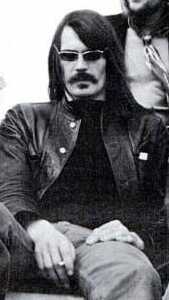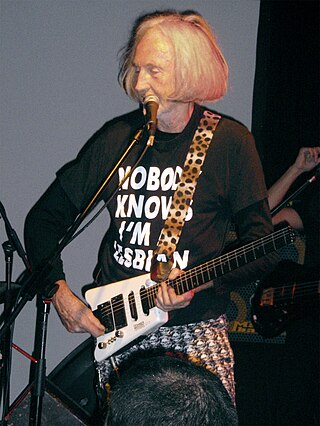
Psychedelic rock is a rock music genre that is inspired, influenced, or representative of psychedelic culture, which is centered on perception-altering hallucinogenic drugs. The music incorporated new electronic sound effects and recording techniques, extended instrumental solos, and improvisation. Many psychedelic groups differ in style, and the label is often applied spuriously.

Soft Machine are an English rock and jazz band from Canterbury formed in 1966 by Mike Ratledge, Robert Wyatt, Kevin Ayers, Daevid Allen and Larry Nowlin. As a central band of the Canterbury scene, the group became one of the first British psychedelic acts and later moved into progressive and jazz rock, becoming a purely instrumental band in 1971. The band has undergone many line-up changes, with musicians such as Andy Summers, Hugh Hopper, Elton Dean, John Marshall, Karl Jenkins, Roy Babbington and Allan Holdsworth being members during the band's history. The current line-up consists of John Etheridge, Theo Travis, Fred Thelonious Baker and Asaf Sirkis.

Kevin Ayers was an English singer-songwriter who was active in the English psychedelic music movement. Ayers was a founding member of the psychedelic band Soft Machine in the mid-1960s, and was closely associated with the Canterbury scene. He recorded a series of albums as a solo artist and over the years worked with Brian Eno, Syd Barrett, Bridget St John, John Cale, Elton John, Robert Wyatt, Andy Summers, Mike Oldfield, Nico and Ollie Halsall, among others. After living for many years in Deià, Mallorca, he returned to the United Kingdom in the mid-1990s before moving to the south of France. His last album, The Unfairground, was released in 2007. The British rock journalist Nick Kent wrote: "Kevin Ayers and Syd Barrett were the two most important people in British pop music. Everything that came after came from them."

Robert Wyatt is an English retired musician. A founding member of the influential Canterbury scene bands Soft Machine and Matching Mole, he was initially a kit drummer and singer before becoming paraplegic following an accidental fall from a window in 1973, which led him to abandon band work, explore other instruments, and begin a 40-year solo career.

Hugh Colin Hopper was a British progressive rock and jazz fusion bass guitarist. He was a prominent member of the Canterbury scene, as a member of Soft Machine and other bands.

Psychedelic folk is a loosely defined form of psychedelia that originated in the 1960s. It retains the largely acoustic instrumentation of folk, but adds musical elements common to psychedelic music.

The Wilde Flowers were an English psychedelic rock band from Canterbury, Kent. Formed in 1964, the group originally featured lead vocalist Kevin Ayers, lead guitarist and co-lead vocalist Brian Hopper, rhythm guitarist and vocalist Richard Sinclair, bassist Hugh Hopper and drummer Robert Wyatt. Despite not releasing any material during their brief three-year tenure, the band are generally considered to be the originators of the Canterbury scene. After their breakup in 1969, the group's members went on to form numerous key bands within the scene, including Soft Machine, Caravan and Camel.

The Soft Machine is the debut album by the British psychedelic rock band Soft Machine, released in 1968. It is the group's only album to feature Kevin Ayers as a member.

Michael Roland Ratledge is a British musician. A part of the Canterbury scene, he was a founding member of Soft Machine. He was the last founding member to leave the group, doing so in 1976.

Roy Babbington is an English rock and jazz bassist. He became well known for being a member of the Canterbury scene progressive rock band Soft Machine.
Brainville were an English avant-garde supergroup fronted by Hugh Hopper (bass) and Daevid Allen (guitar), both previously in Soft Machine.
Gary Windo was an English jazz tenor saxophonist.

Richard Coughlan was an English musician, best known as the drummer and percussionist of the Canterbury scene progressive rock band Caravan. He was one of the founding members of Caravan in 1968 and remained with the band until his death. AllMusic called Coughlan "one of art rock's longest tenured musicians".
Pierre Moerlen was a French drummer and percussionist, best known for his work with Gong and Mike Oldfield and as Pierre Moerlen's Gong.

Joy of a Toy is the debut solo album of Kevin Ayers, a founding member of Soft Machine. He is accompanied on the LP by pianist and arranger David Bedford as well as his erstwhile Soft Machine colleagues Robert Wyatt and Mike Ratledge, and his eventual replacement Hugh Hopper, who had previously worked with him in the semi-pro band Wilde Flowers. Among the session musicians are cellist and arranger Paul Buckmaster, jazz bassist Jeff Clyne, oboist Paul Minns and drummer Rob Tait.
Experimental rock, also called avant-rock, is a subgenre of rock music that pushes the boundaries of common composition and performance technique or which experiments with the basic elements of the genre. Artists aim to liberate and innovate, with some of the genre's distinguishing characteristics being improvisational performances, avant-garde influences, odd instrumentation, opaque lyrics, unorthodox structures and rhythms, and an underlying rejection of commercial aspirations.

Christopher David "Daevid" Allen was an Australian musician. He was co-founder of the psychedelic rock groups Soft Machine and Gong.
Romantic Warriors III: Canterbury Tales (2015) is the third in a series of feature-length documentaries about Progressive rock written and directed by Adele Schmidt and José Zegarra Holder. This one focuses on the music of the Canterbury scene.

Theatre Royal Drury Lane 8th September 1974 is a 2005 live album by English progressive rock musician Robert Wyatt, documenting a concert on that date at the Theatre Royal, Drury Lane in London. The concert took place the year after Wyatt had fallen from a fourth-storey window and become paralysed from the waist down. Since the accident, Wyatt has used a wheelchair. The concert remains Wyatt's first and only live performance as a headlining solo artist.












